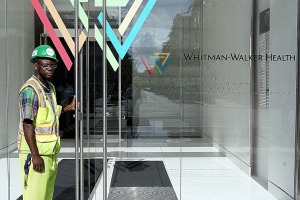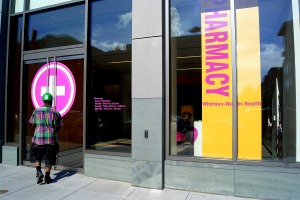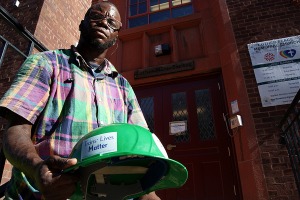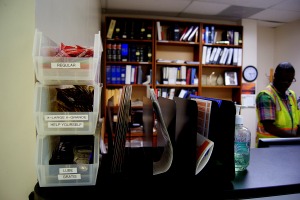By Charlotte Bouwman, dpa
The US media have focussed on the story of celebrity athlete Caitlyn Jenner, who transitioned from male to female. But poor and obscure people say gender change remains a battle. Achim Howard, who was born a girl but became a man, tells dpa his compelling story.

Washington (dpa) – Just like any other church, the Unity Fellowship Church (UFC) holds a service every Sunday morning. The members, mostly African Americans, get together in the Howard Thurman Chapel of Howard University and sing, pray and worship.
But whereas many churches condemn homosexuality, or at least regard it as a big taboo, the UFC welcomes LGBT people with open arms.
“The first sexual reassignment actually took place in Genesis,” Achim Jeremiah Howard says. “When God used Adam’s rib to create Eve, that is when it first happened: in the Bible.”
The 44-year-old African-American construction worker is a deacon at the UFC in Washington DC.
Ever since he can remember, Howard felt like a man. But that isn’t the gender assigned to him at birth: he was born as a girl, CeTenia Elizabeth-Renee Howard.
Some think that life is now easier for transgender people after the high-profile coming out of US celebrities like the one-time male Olympic athlete Caitlyn Jenner, Chaz Bono and Laverne Cox.
Everyone seems to be talking about it, and even The New York Times has run two full page editorials advocating for transgender rights. Transgenders marched openly in gay pride parades in Israel and Turkey this year, gaining media attention.
When the Girl Scouts of Western Washington refused 100,000 dollars because the donor specified the gift could not be used to support transgender girls, a fundraiser to replace the donation quickly raised more than 175,000 dollars.

What does this mean for ordinary people for whom this is not a juicy story, but something they have to face in their everyday life – an essential part of their being?
Howard welcomes all the attention, but thinks it focusses on the glamour and ignores all the dangers transgender people experience.
“Chaz Bono is actually a friend of mine,” Howard says, “and I’m grateful and joyful that he and Caitlyn were able to come in peace with themselves, to walk in their own truth. But the media are trying to make them an icon for the transgender community.”
He is still for a moment, and then declares: “They are NOT my icon. Not all of us were born with a silver spoon in our mouth.”
The black trans community is not acknowledged, Howard says.
“Caitlyn didn’t even recognize the fact that she wasn’t the first transgender woman on the cover of a magazine. There were people who paved the way before her, like the people who built the Stonewall or the kids in Paris is Burning,” he says.
Stonewall refers to the 1969 riots in Manhattan’s Greenwich Village that are widely recognized as the single most important event that fired up the gay liberation movement.
The 1990 documentary Paris is Burning follows five young transgender personalities – and portrays the end of the “Golden Age” of drag balls that drew African American, Latino, gay and transgender communities in the 1980s.
“Caitlyn has to give those people credit for what they achieved, but she doesn’t,” Howard sighs. “Many of us can’t even get health care or surgery. The people we need to look up to are people within our own community, not Caitlyn or Chaz.”

Still, Howard’s youth would probably have been easier if he’d had an icon to look upon to. He grew up in Washington DC and Prince George’s County, Maryland, just outside the nation’s capital.
“It was obvious that I was unwanted,” he says. His childhood was rough. He was exposed to physical, mental and sexual abuse. His father was killed in 1974. He hasn’t spoken to his mother in 30 years. Only his aunt accepted him for who he felt he was.
“When I came out as a man, she said, ‘I don’t know why everyone else wasn’t seeing it’,” Howard says.
But Howard made himself a new family, a family of other LGBT people. “I am lucky. I have been blessed with different father figures throughout my life.” In high school, Howard mostly hung around guys, playing football, riding bikes and running track for his school.
“I was accepted as a guy. But I had to fight for it,” he says.
He fought a lot, earning his nickname Rocky. But when he got older, and his body began to change, things got harder.
At age 35, in 2004, Howard ended up homeless. Looking back, he says that’s when his transition really started, although he didn’t know it at the time.

While living in N-Street Village, a woman’s shelter, Howard got in touch with the Unity Fellowship Church that held services there. In the beginning, he was sceptical. “I had gone to many different churches before. I had heard people say that being gay is a sin, that transgenders deserve to live in hell,” Howard says. But he started visiting the church every Sunday. He sat silently in the back of the church, “until on one day, God brought me to the front.”
The Unity Fellowship Church was founded in the 1980s by Carl Bean, a Motown singer mostly known for his song ‘Born this way’ – and now an archbishop in the church. Being gay and believing in God, Bean looked for a church that would accept him as he was, because he was convinced that God loves everyone. In 1982, he founded his own church for openly gay and lesbian African Americans. There are now 17 churches across the US.
When Howard was, as he says, “brought to the front,” he started playing drums brought by another member. After that, he felt more and more comfortable in his new environment, and even started singing in the choir. Howard also visited the pastor every week for talks. Led by those conversations, he decided he didn’t want to be CeTenia anymore. Even though everyone called him Howard, his last name, he decided he needed a new name. He wanted to be an openly transgender man.
Howard says he chose two Hebrew names from the Bible. He says Achim means “God will deliver,” chosen because he had hit rock bottom when God came to him. He says Jeremiah means “is altered by God,” chosen because he was then able to alter himself and became a man.
In 2011, Howard was sexually assaulted, like many of his friends. A few months later he found out he was HIV positive.
“I do not tell you this to have sympathy,” he says. “It is something that happens. Someone put something in my drink, and a few months later I found out I had HIV.” Howard still doesn’t know who assaulted him, but he stays faithful.
“God doesn’t make mistakes, that’s why I started advocating. I don’t only want to talk about trans, but also about the dangers trans people have to face, such as AIDS. I have to educate, fight and raise awareness,” he says.
Howard has never had the opportunity to undergo surgery. “I don’t like to speak about this topic, because people focus too much on the surgery. Everyone should be accepted as the gender that they want to be, with or without surgeries.” The fact is that having genital reassignment surgery in the United States is quite expensive, because most health insurance plans do not cover the considerable costs. In other countries like the Netherlands, coverage is mandated. Howard admits that he would have “most definitely had surgery” if he lived in a place where it was covered.
Washington DC law however mandates health insurance companies to cover transition-related health care. This is how Howard gets coverage for the testosterone injections – ‘T-shots’ – that he takes every two weeks. Anecdotally, many transgenders have experienced assaults – sexual, physical and verbal. Absolute data about discrimination is not available. But according to a survey of 6,450 transgenders, 90 per cent experienced some form of transgender-based discrimination. The National Center for Transgender Equality and the National Gay and Lesbian Task Force released the “Injustice at Every Turn” report in 2010.
Homelessness is another problem. Transgenders often cannot find work and are rejected by their families. The common shelters for homeless people do not serve them. “A lot of LGBT kids rather stay on the street or become a sex worker, so they don’t have to be in these shelters where they feel unsafe,” Howard said. Howard volunteers at the monthly Name & Gender Change Clinic at the Whitman-Walker Health centre, which offers free legal help to change documents and solve health insurance issues. The clinic has for decades been a service point for HIV-AIDS crisis in the nation’s capital. Howard also helps in a house for transgender youth, an effort to prevent young transgenders from living on the street. He watches over five ‘sons’ there.
“But one, I couldn’t save,” Howard says, shaking his head sadly. Blake Brockington committed suicide at age 18, a couple months back. “He felt outta place. He will always remain a legacy in my rainbow family.”
Suicide is not uncommon among transgender people. Forty-one per cent surveyed in the “Injustice” report said they had attempted suicide, compared with 1.6 per cent of the general population.
Another study this year by the Williams Institute, a think tank that deals with gender identity law at University of California at Los Angeles (UCLA), found that “transgender respondents who experienced rejection by family and friends, discrimination, victimization, or violence have a higher risk of attempting suicide.”
“That’s what bothers me with Caitlyn,” Howard says. “She got her breasts done on her own TV show! That’s not the way we walk our daily walk. We have to work, find a place to sleep.”
“We have trans brothers and sisters being killed and assaulted. Lots of us commit suicide. I tried it myself numerous times. There is nothing iconic about coming out on the cover of a magazine, because that is not something we can relate to.”
Still, Howard sees hope for the future. “When you think of history we’ve always had people that were oppressed. My own race faced slavery, and it was a big fight, but we overcame it.”
Howard opens his arms wide, speaking to the dpa reporter.
“Look at us now. We sit here and I tell you, a white woman, how I feel, and you listen to it. You care. Little more than a decade ago, I would be punched in the face, maybe even be killed for it. Not anymore.”
“Right now, it’s the trans people that are oppressed. We are discriminated, assaulted, killed. But we are fighters. People will have to see that no, we’re not crazy, no, we’re not confused. We just have to keep on fighting. Because there is no progress without struggle.”
Report: Name-change clinic in US capital helps transgenders over hurdles
By Charlotte Bouwman, dpa

Washington (dpa) – Five people silently sit at a big wooden table in the middle of a room, filling out forms. In sweeps Savannah, tall and striking, with long brown hair and wearing a maxi dress.
Savannah is a transgender woman and a TransLAW volunteer. In a loud, deep voice, she announces that she made a cake for this special occasion and puts it on the table.
“Take whatever you need,” she encourages the visitors, most of whom seem uncomfortable with the situation.

The “situation” is this: Changing your sexual identity and name entails a myriad of beauracratic hurdles. Each state has different laws, and even within states, individual counties or cities might require different steps. Then there are the federal laws.
In the room this July day are people undergoing their transition from male to female or vice versa. They have come for the special Name And Gender Change Clinic at the Whitman Walker Elizabeth Taylor Medical Center to get help with the legal issues.Amy Nelson is the legal services director of Whitman Walker Health. “We are doing the clinics for three years now, and we’ve helped over 500 people,” Nelson says.
Photos of former clients decorate her office walls.
“We also made a video, in which a couple of clients told their stories. It is important that people get to the concrete impact of the work we do,” Nelson says.Most of the people who attend the clinics have a low income and little or no access to elective health care. Some don’t speak English, some cannot read, some have mental issues.
“Tonight is all about helping those people to get the right documents and to help them get the health care access that they are entitled to,” Nelson explains.The free monthly clinics are organized by the community medical center that specializes in LGBT care along with a team from TransLAW, Trans Legal Advocates of Washington.
TransLAW provides free legal help and some financial assistance to transgenders who might otherwise be unable to afford to change their name and gender markers on identity documents, according to its website.
More than 500 transgenders over the past three years have received help through these clinics in Washington alone. Similar clinics are held around the country in places like Little Rock, Arkansas; Richmond, Virginia and Arizona.The forms people are filling out differ according to where they live in the region: Virginia, Maryland or Washington, DC. TransLAW has made guides for each state and the District of Columbia.
The client takes the filled out forms to a private session with two volunteers, in a separate room. Each document must be checked for name and gender change: driver’s license, federal documents, passport, military ID.
If necessary, they help clients apply for Medicaid, the federal and state health coverage for low income people. They help them pursue a proper education and find a transgender-friendly workplace.
As more people come in – in all, it was 11 that evening – the volunteers spread to the different offices. Most clients came on their own, some with a friend or a partner. Over the past two years, Nelson has noted that an increasing number of family members come along as public attitudes have grown more accepting.
From outside appearances, it is clear that some are in transition.
“You definitely fooled me,” one of the clients tells volunteer Achim Howard after hearing about his transition from female to male.Next week, another volunteer, Devon Tensley, a transgender man, will go to court with all of the clients from the evening to file the documents.
“It’s nice to go and know that someone’s there to have your back,” Howard says. “When I went there, I wasn’t expecting anyone. But a volunteer was at the court and it really helped me when I saw him. It took away my anxiety.”
After documents are filed, it can take several months for approval at a court session.